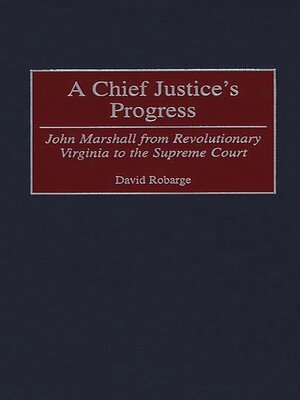A Chief Justice's Progress
ebook ∣ John Marshall from Revolutionary Virginia to the Supreme Court · Contributions in American History
By David Robarge

Sign up to save your library
With an OverDrive account, you can save your favorite libraries for at-a-glance information about availability. Find out more about OverDrive accounts.
Find this title in Libby, the library reading app by OverDrive.



Search for a digital library with this title
Title found at these libraries:
| Library Name | Distance |
|---|---|
| Loading... |
Widely regarded as America's most important Chief Justice, John Marshall influenced our constitutional, political, and economic development as much as any American. He handed down landmark decisions on judicial review, federal-state relations, contracts, corporations, and commercial regulation during a thirty-four year tenure that encompassed five presidencies, a second war of independence, the demise of the first American party system, and the advent of Jacksonianism and market capitalism. This is the first interpretive study of Marshall's early life that emphasizes the formative influences on him before he joined the Court. By that time his character and attitudes were fully formed through his childhood in the Virginia gentry, his service in the state militia and Continental Army, and his work as a prominent lawyer, a Federalist, and a diplomat.
Drawing heavily on Marshall's own writings, this study views his pre-Supreme Court life as a cumulative experience that formed the identity and value system that he brought to bear on his experiences as Chief Justice. Robarge examines Marshall's social and political education in the unique milieu of late 18th century Virginia for its own intrinsic interest, as well as for its relationship to his profound contribution to the Court. The events and situations that shaped Marshall's personality and attitudes directly influenced his leadership style. They also had a deep impact upon his efforts to establish an independent judiciary, to unify the nation through territorial expansion and a legal common market, and to revive the moribund Federalist party as a balance to the dominant Republicans led by the cousin he detested, Thomas Jefferson.
Drawing heavily on Marshall's own writings, this study views his pre-Supreme Court life as a cumulative experience that formed the identity and value system that he brought to bear on his experiences as Chief Justice. Robarge examines Marshall's social and political education in the unique milieu of late 18th century Virginia for its own intrinsic interest, as well as for its relationship to his profound contribution to the Court. The events and situations that shaped Marshall's personality and attitudes directly influenced his leadership style. They also had a deep impact upon his efforts to establish an independent judiciary, to unify the nation through territorial expansion and a legal common market, and to revive the moribund Federalist party as a balance to the dominant Republicans led by the cousin he detested, Thomas Jefferson.







